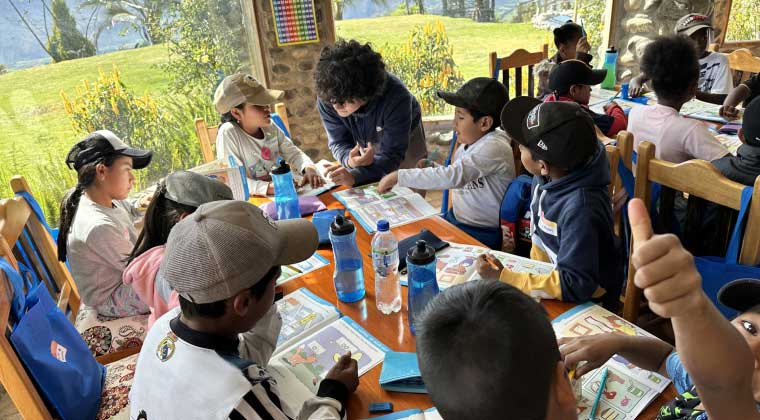A camp in the province of Imbabura aims to empower children through English language education.
In a remote corner of Ecuador’s Sierra region, to date 79 children from impoverished villages have discovered a new path to a brighter future. This opportunity comes courtesy of a 17-year-old American who has used English language education as a means to unite cultures, combat racism, promote environmental stewardship, and inspire dreams.
The initiative began in 2021 with 13 children, aged eight to 13, who were selected by their schoolteachers in the town of Pablo Arenas, Imbabura. These children participated in a week-long camp designed by Matthew Jalili, who was only 13 years old at the time.
As the years passed, interest in the camp grew. By the fourth edition, held in August 2024, the number of participants had increased to 23 children from the towns of Pablo Arenas, La Victoria, and Cahuasquí. The camp, located near the ‘Montaña de Luz’ community, offers its programs free of charge.
“Our goal is to teach English and provide these children with more opportunities,” said Jalili. “But we also want the children to connect with one another and recognize their shared humanity in a region where the Afro-Ecuadorian population has faced racism.”
Children participate equally in workshops coordinated by the international education firm ‘Xplorer,’ with classes led by American volunteer teacher Andrew Tulman and his daughter Ariana, supported by young Ecuadorian and Swedish volunteers.
English as a Tool for Growth
Beyond its educational value, the camp has become a source of inspiration and empowerment for the children, many of whom have never ventured beyond their villages. Through the camp, they are exposed to new cultures and customs, fueling dreams of future opportunities.
“English opens many doors for work and economic advancement,” Jalili explained, noting that if the children start businesses in the future, they will be able to connect with organizations in the United States.
Jalili, who resides in the United States, hopes the camp will spark a lifelong love of the English language. To support this goal, each child was given a tablet, with plans to offer online classes in the future to help them continue practicing the language.
Jalili emphasizes that English will help the children forge international connections, access educational opportunities, dream of entrepreneurship, and even attract foreign tourism to their towns, thereby generating economic resources to improve their quality of life.
But the camp’s impact extends further: it also instills a respect for nature. The camp takes place at ‘Montaña de Luz,’ an eco-spiritual haven that has transformed a once rugged hill into a lush garden filled with colorful flowers, fruit plants, palm trees, orchids, and more.
“Children learn to respect plants, gardens, and the mountains,” said Jalili, adding that the children also contribute to the environment by planting their own plants.
Additionally, they receive lessons about the flora of the botanical garden at ‘Montaña de Luz,’ a wildlife refuge home to hundreds of plant species and over a thousand orchids, where wild rabbits roam freely.
“Thank You”
With the support of his family, Jalili has worked tirelessly in his native New Jersey to help the children. Along with classmates, he founded a club to raise funds and collected nearly a thousand English books, which now fill the library of Pablo Arenas’ school, offering children a fun way to engage with the language.
Jalili highlights the cultural exchange fostered by the camp, which also serves as a space for artistic expression. He recalls watching women perform a traditional dance, balancing bottles on their heads to lively music—an art form unique to the area.
The camp has already built bonds between communities, as Jalili has noticed that children from different villages no longer see each other as strangers but as “companions.”
Jalili fondly remembers a moment when a little girl’s mother gifted him a cake decorated with the words “Thank you.”


0 Comments